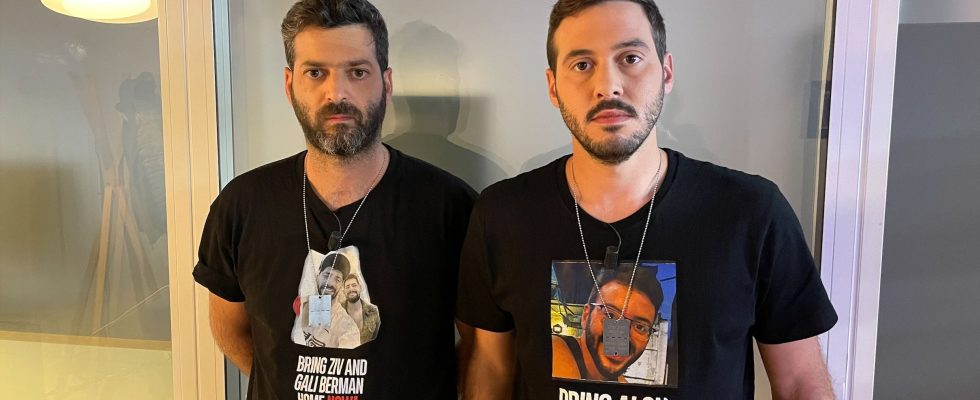In a bag, they folded t-shirts expressly made for their visit to France. The fabric is black, flocked with a photo of Ismaïl Haniyeh, leader of the Hamas terrorist organization, stuck to that of Kylian Mbappé, all titled in French: “Qatar must choose its side” and captioned “sponsored by Qatar”. This Friday, December 8, the small delegation of four families of hostages captured in the kibbutz of Kfar Aza on October 7 and, since then, detained by Hamas, does not care much about diplomatic games, billiards for three, five or ten -eight gangs, negotiation channels and political acrobatics. They can’t take it anymore. They died of anguish, mad with rage. They are angry with the whole world, with their government, which does nothing for their loved ones, with world opinion, which is already getting used to the slow death of their loved ones, and they came to Paris, led by the lawyer Calev Myers, founder of the NGO Arise, to “make noise” and say how for two months and a day every hour has been torture for them. Will they see Alon Shamriz, a 26-year-old student, Doron Steinbrecher, a 30-year-old veterinary nurse, and the angelic faces of Ziv and Gali Berman, 26-year-old twins?
Yonatan Shamriz, one of Alon’s brothers, no longer knows how to smile. Face hollow, eyes sunken, he doesn’t understand: “How can you put up with seeing Qatar buy your footballers, your museums, in fact buying everything from you, in France, [alors que ce pays] shelters and finances Hamas. All it would take is for Qatar to tell the terrorists to release their prey and it would be resolved in two minutes.” These four families lived in the Kibbutz of Kfar Aza, they worked there, raised their children there, looked after their parents there. “It’s was 98% heaven and 2% hell. Now, it’s 100% hell,” says Yamit Ashkenazi, Doron’s big sister. The place was so harmonious, so popular that candidates had to wait two years before being able to hope to join the project and build a house there. They tell of the 800 families, all linked, the kindergarten, where theirs played where their little ones had had fun before them, they describe the trees, the fruits, the agriculture and the “We are one family, we love peace, we don’t play politics.” With them, for decades, the dozens of Gazan workers, who “were like brothers”, brothers who, when evening came , returned to Gaza and their sad fate. They now know that the very ones with whom they shared meals and work betrayed them, they assure that it was they, they alone, they of course, who entrusted the Hamas terrorist movement with the plans of the kibbutz with indications to identify the houses where the weapons stocks, the telephone exchange, the generator were. They say that the attackers followed an incredibly efficient process, a plan hatched from the inside. “All traitors,” they spit, waxen lips. “They first killed the teachers who took care of the children,” adds Yonatan Shamriz. They escaped, in five minutes, they fled, they no longer have identity papers, no more personal objects, they live in a hotel and the clothes they wear were offered to them.
Thursday they were in Brussels, Saturday they will be in Strasbourg, this Friday they were received at the Senate. They distribute their t-shirts everywhere. “It is you who have power over Qatar, it is not Israel,” they repeat, not wishing to dwell on the policy pursued by their Prime Minister. In their distress, they are particularly angry with the International Committee of the Red Cross (ICRC), the catalyst for their painful helplessness and their reason abdicated by grief. Let no one come and talk to them about neutrality, transmission channels, or the senseless drama that the Palestinians are experiencing. They don’t hear. In Geneva, on October 20, they met Swiss diplomat Mirjana Spoljaric Egger, president of the ICRC. She cried as she listened to their stories. And it makes them even more angry that she cried, while their sisters, their brothers are dying. “Why has the ICRC never visited a single hostage? What do they do, apart from playing taxi when there are releases so that we can see their logo on television? Nothing, nothing !” Yonatan can’t take it anymore, he takes a breath, adds that, of course, “we must protect civilians on both sides”, but, there he is, he only sees one side, that of his detained brother, without any prospect of being released soon. Besides, is he even alive? Hamas killed 63 people in the Kibbutz of Kfar Aza, captured 19, released 12, women with their children. The clock is ticking, they get up, mute, mechanical. In their hands, posters representing the faces of their loved ones. And in their bag, the t-shirt that says pain blinds. And that diplomacy is none of their business.
